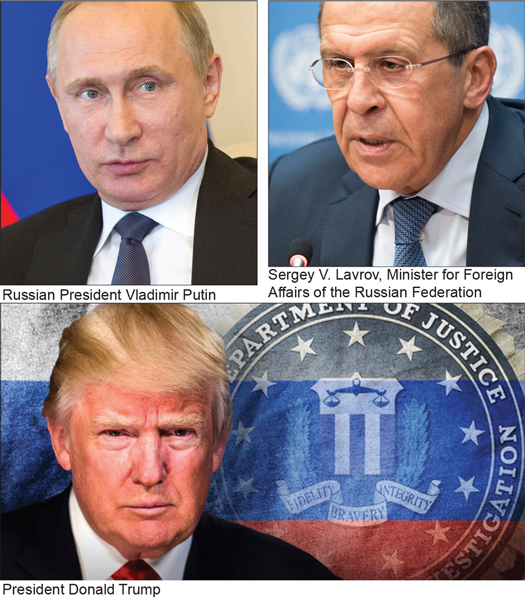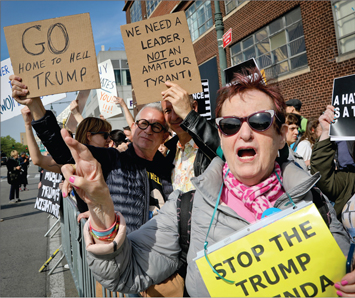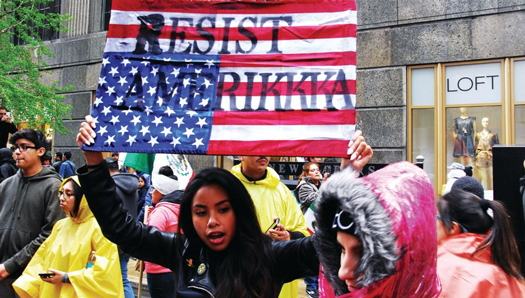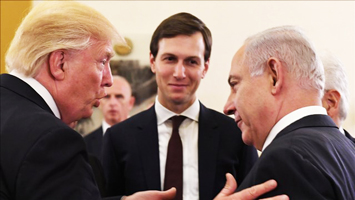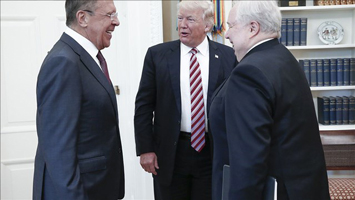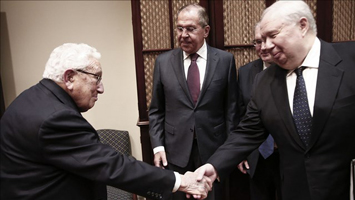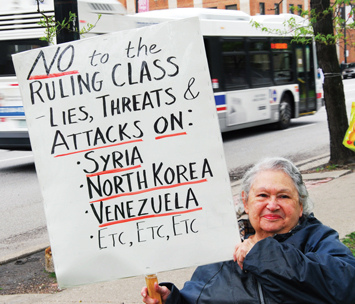Blood & Politics: Incivility, vitriol, violence and American politics
By Askia Muhammad, Starla Muhammad and Tariqah Shakir-Muhammad | Last updated: Jun 20, 2017 - 1:36:36 PM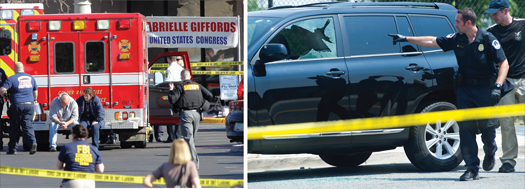
(L) In this Jan. 8, 2011, file photo, emergency personnel work at the scene where Rep. Gabby Giffords, D-Ariz., and others were shot outside a Safeway grocery store in Tucson, Ariz. Survivors of the mass shooting at a constituent event hosted by former U.S. Rep. Giffords said Wednesday's attack at a congressional baseball practice brought back painful memories of the day six were killed and 13 were injured in what was supposed to be a time for citizens to engage in the political process. (R)Crime scene investigators search for evidence on an automobile with a damaged driver's window at the scene of a multiple shooting involving a member of Congress during a Congressional baseball practice, June 14, in Alexandria, Va.
|
WASHINGTON - The blood sport of political rhetoric—which has led to wanton violence visited upon innocent Black people and Muslims around the country since the Trump political campaign—visited Republican members of the U.S. Congress in mid-June.
The encounter left the third-ranking House member seriously injured, four others hurt, and the reported shooter dead in Arlington, Va.
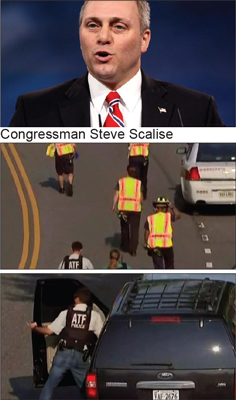
ATF at crime scene in Alexandria, VA where GOP House leader Steve Scalise is among 4 injured in Virginia shooting while practicing for charity baseball game. Photos: MGN Online
|
The incident sent the Capitol into shock. Ironically, the Capitol Police Board and many in the congressional leadership commended two officers assigned to the Whip’s leadership security detail with praise for their “immediate and decisive actions” which prevented more injuries. Both of the officers who were injured when they returned the shooter’s fire, ironically, are Black.
“We are profoundly grateful for the heroism of the Capitol Police, whose bravery under fire undoubtedly saved countless lives,” House Minority Leader Nancy Pelosi (D-Calif.) said in a statement. “On days like today, there are no Democrats or Republicans, only Americans united in our hopes and prayers for the wounded.”
The call to tone down political sniping and rhetoric was espoused on both sides of the aisle soon after the shooting, even by those guilty of utilizing and benefiting from partisan vitriol, namely the current U.S. president.
A pattern of vitriol
Rep. Danny K. Davis (D-IL.) believes that there were hints of serious division as early as the 2016 presidential campaign. “There were lot of warnings during the campaign; one is that the vices, tactics, approaches were not good for the country,” he told The Final Call.“There is tremendous division in America in terms of the split of those who fuse one thing one way. There is extremism on the right and to some degree extremism on the left. The people on the right are talking about taking back the country,” said the Chicago Democrat.
During the contentious presidential campaign, Mr. Trump promised to pay the legal fees of one of his supporters who sucker-punched a Black protestor who was in police custody, Democrats, Black people, and Muslims have been under relentless attack.
“We can all agree that we are blessed to be Americans,” said Mr. Trump in remarks delivered from the White House in response to the Arlington shooting. “Our children deserve to grow up in a nation of safety and peace and that we are strongest when we are unified and when we work together for the common good,” he added.
“We may have our differences, but we do well, in times like these, to remember that everyone who serves in our nation’s capital is here because, above all, they love our country,” said Mr. Trump. This is a far cry from the man behind the “birther” movement that attempted to discredit and delegitimize his predecessor and first Black U.S. president Barack Obama. And a candidate who famously stated he could stand in the middle of Times Square in New York City, “shoot anybody” and no one would care—and who egged on his audiences on the campaign trail to “lock her up” in reference to Hilary Clinton and verbally eviscerated his primary opponents with belittling and demeaning comments.

Ted Nugent
|
“I just think in these heightened, exciting times politically, I am reaching out across the aisle, and I’m saying we must all unite to bring no violence, no harm to any of our fellow Americans,” said Mr. Nugent.
How long this bipartisan “time out” will last is anyone’s guess. There were already disputes resurfacing between the Democrats and GOP a few days after the congressional baseball game that went on as scheduled. Senate Democrats accused Republicans of not being transparent when it comes to finalizing new healthcare legislation. Democrats planned to object to routine requests to let the chamber operate—whether it’s scheduling votes or allowing committees to meet for extended hearings—in a move aimed at escalating the fight over health care, reported Manu Raju of CNN. Doing so could eviscerate any bipartisan atmosphere that existed after the shooting, he noted.
“Unfortunately this anger is a continuous part of a cycle of violence in the United States and represents decades of political waring. This shows the level, climate of political division in the country. Look at what happened with the election of Trump,” said Todd Shaw, assistant professor of Political Science and African Studies at the University of South Carolina.
“We see that political anger has boiled over. And we know that the American people want to see things better … . But it has to start from the grassroots efforts, with locals who can raise questions of concerns for the leaders to listen to what’s important to the masses,” he told The Final Call.
Violence and anger has not just been reserved for those on the far right. Several conflicts resulting in violence have erupted on the far left as well. Several college campuses have been flashpoints of resistance to far-right speakers. Heated protests forced the cancellation of speakers slated to present at University of California-Davis and other universities.
Missouri State Senator Jamilah Nasheed spoke very candidly about the recent shooting and felt what is being seen is to be expected—unless the two parties work together. “Many Americans are angry and we are witnessing the political discourse that has occurred since the election of President Trump, I don’t care which party it is, I don’t condone anyone being shot or killed because of disagreements,” she said.
“We are feeling the impact of a partisanship of America. And until the two parties can see the common good of every citizen then can we stop the feuding. The way things are now only the rich and powerful are benefitting the most from our local and national level. Lastly, I have to say, there’s a really dark cloud over this country and something has got to give,” said the state senator.
History of violence
It could be stated that violence in U.S. politics is as American as apple pie and is rooted in the very foundation of the country. It is nothing new.The threat and execution of violence around elections has a long, sad history in American politics, noted Jesse Rhodes, associate professor of political science at the University of Massachusetts Amherst. Similar to the 2016 presidential election, much of the conflict revolved around issues of race and immigration and “efforts by disadvantaged (and often nonwhite) citizens to secure greater political influence have been met with violent repression by those already enjoying power (usually more affluent Whites) throughout American history,” he noted in his article, “Violence has long been a feature of American elections.”
“Violent conflict surrounding elections goes all the way back to the beginning of American history. The Founding Era—often portrayed as a period dominated by outstanding, level-headed statesmen who set the United States on a course toward inevitable greatness—was actually a chaotic period,” he opined.
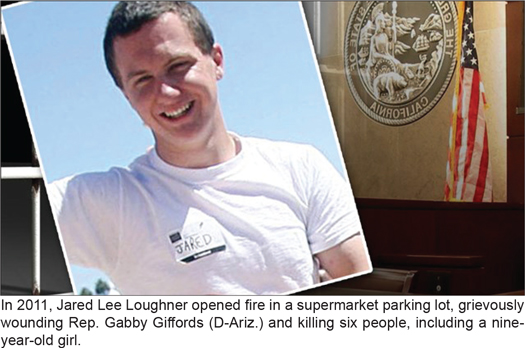 |
In 2011, Jared Lee Loughner opened fire in a supermarket parking lot, grievously wounding Rep. Gabby Giffords (D-Ariz.) and killing six people, including a nine-year-old girl. Before that shooting, 2008 GOP vice-presidential candidate Sarah Palin’s political action committee circulated a map of targeted electoral districts that put Ms. Giffords and 19 other Democrats under stylized cross hairs, according to The New York Times.
“The sad thing is that these mass shootings have become the new normal,” Rep. Keith Ellison (D-Minn.) told “Democracy Now!” “I mean, the extraordinary thing about what happened to Steve Scalise is that he’s a member of Congress. But, of course, that’s not even the first time that happened. Gabby Giffords was shot as she was doing Congress on Your Corner in her district only a few years ago. So, even members of Congress getting shot somehow has not prompted us to take a look at what we’re doing, and what we’re not doing, when it comes to making the country safer.”
Rep. Ellison and other Democrats urge stronger regulations on access to automatic, military-style assault weapons. But one Republican congress member urged further relaxation gun laws in the District of Columbia, even though the Scalise assault occurred in neighboring Virginia.
“They brought this on themselves,” a senior staff aide for a member of the Congressional Black Caucus told The Final Call. “And it’s only going to get worse.”
Indeed, on the day of the congressional shooting, three people were killed by an angry shooter at a San Francisco UPS facility.
“I do think, you know, just the Wild West atmosphere that we have, in terms of regulating firearms, is ridiculous,” Rep. Ellison continued. “And other countries don’t do this. And, of course, as a result, they’re a lot safer, when it comes to this danger.”
That Wild West atmosphere has resulted in four of the 45 U.S. Presidents being murdered in office and even more have survived serious assassination attempts. No other modern, industrial country has a record of violence in high office that even comes close.
“I above anyone in here,” Rep. Pelosi said on the House Floor the day after the shooting, “and I can say that quite clearly, have been probably the target of more—I’m a political target and therefore the target of more threats than anyone, other than the president of the United States, Barack Obama.”
What does the future hold?
The shooting of Rep. Scalise shows a clear picture of political divisions now and in the future, said many analysts. The question remains whether civil discourse is even possible amid these strident differences.Another concern is that both major political parties do not pay enough attention to the most prominent and important issues such as racism, poverty and human rights. Jared Ball, a professor of media and Africana Studies and at Morgan State University, noted the incivility between parties is based on competition and opposing interests.
“What we see now, as ever, are two parties taking turns using one or another incident to fraudulently reposition themselves as legitimate representatives of their claimed constituencies and in uncivil opposition to one another. But it’s phony,” said Prof. Ball.
“If we had a political party that actually represented Black, Brown, Indigenous and working people there would be beautiful civility between our party and those in existence now that represent only the truest minority ever; the rich, the White, the male.”
Following the Virginia baseball practice attack, violence against Muslims escalated in this country and in the United Kingdom.
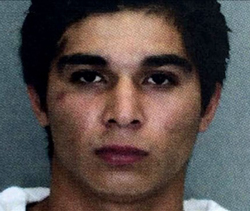
Darwin Martinez Torres, a suspect in the murder of a 17-year-old Muslim girl
|
And a van plowed into worshippers near a London mosque in the early hours of June 19, injuring 10 people, two of them seriously, in what Prime Minister Theresa May said was a sickening, terrorist attack on Muslims.
The Honorable Elijah Muhammad, patriarch of the Nation of Islam, wrote about what he called “outlaw action” permitted in America and “precautionary action” should be taken to protect those in high government positions because they do not always have the full support or backing of the people.
In his monumental book, “The Fall of America,” Mr. Muhammad spoke of the time period of over 60 years between the assassinations of Presidents William McKinley and John F. Kennedy.
“Again, it shows to the world that the government of America and its people are actually given to such outlaw and violent action,” he wrote.
“To take human lives at will, disregarding their own legal law against such action, makes the country be classified as a country or government of outlaws—where people have no safety of their lives under the law which claims to safeguard the lives of human beings,” continued Mr. Muhammad.
His National Representative, Minister Louis Farrakhan, expressed concern a year before the election regarding the tone and tenor of what was happening in U.S. politics, warning it was “dangerous for the future of politics and for the future of America when we become uncivil in our discourse.”
From the rise of the anti-Obama Tea Party to the rise of and election of Donald Trump and the subsequent Resist Trump movement, the battle lines have been drawn. Ugly rhetoric and demonization of opponents have also been a formula for political success—and it may be a formula that is too alluring to resist, despite the sweet talk about softening language. But at what cost to the country?
(J.A. Salaam contributed to this report.)
